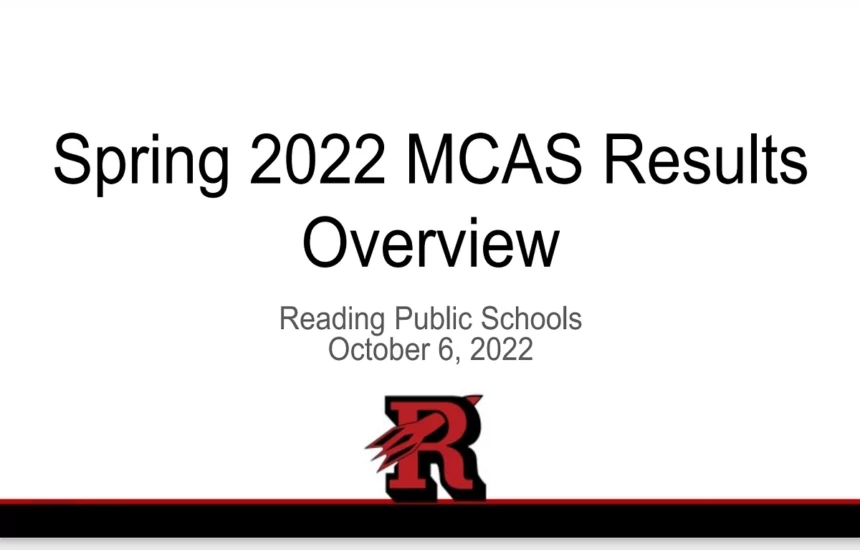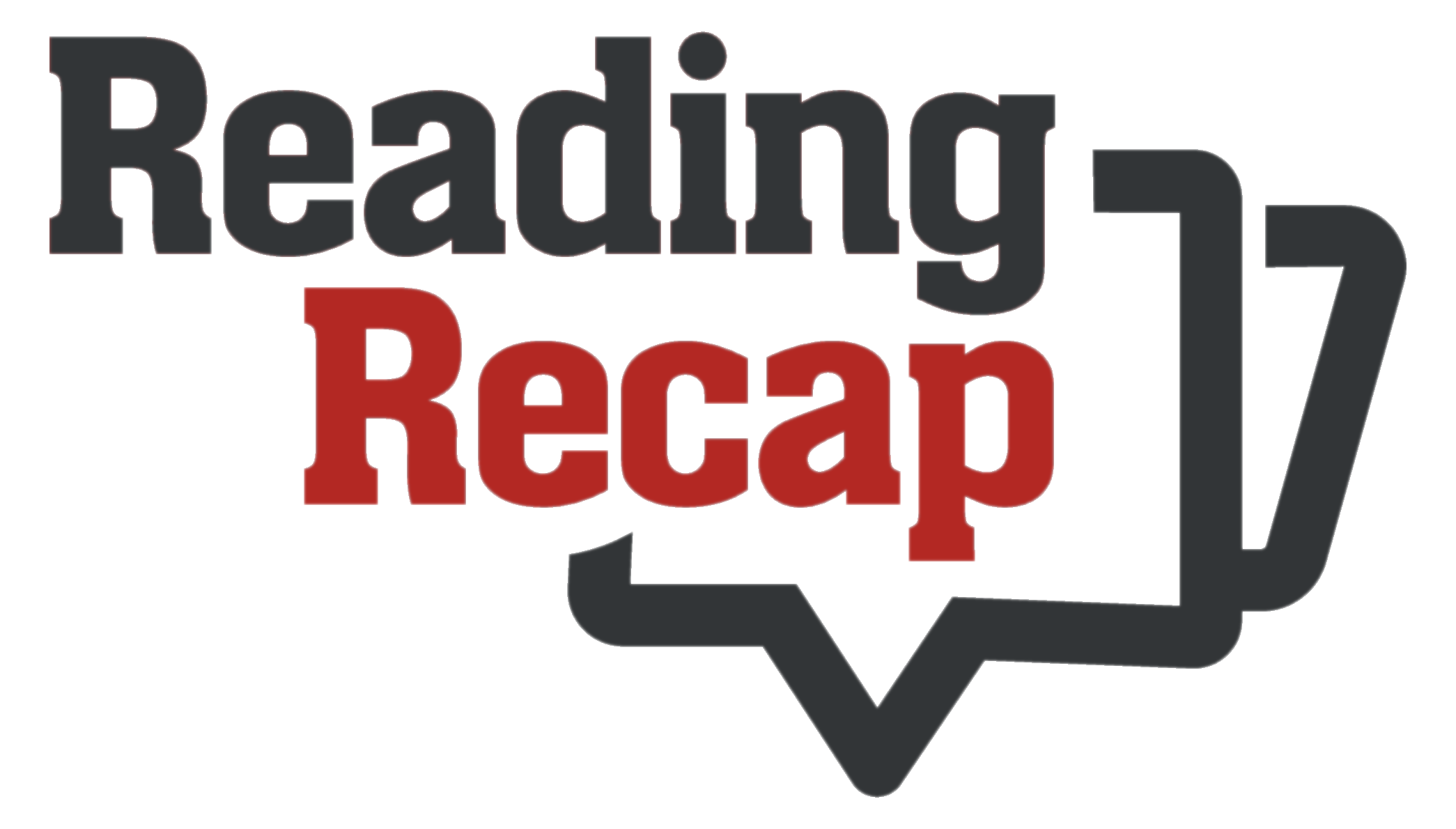School Committee PREVIEW – Reading School Committee to meet on Thursday 10/6/2022 at 7PM – Topics include entry plans of new principals, review of MCAS results, review of district improvement plan, review of FY22 financials, and more…
The Reading School Committee (SC) is meeting on Thursday October 6, 2022. The meeting will include several possible votes (including the mandated approval of the RMHS handbook), as well as presentations on the new principal entry plans from the new principals of Barrows, Wood End, Parker and the new (acting) principal of RISE; high level presentation on the MCAS results, discussion of the district improvement plan, the FY22 financial results, the usual reports, and a special presentation to several RMHS seniors who received National Merit awards based on the fall 2021 PSAT exam.
The meeting is being held at 7pm at the Reading Memorial High School (RMHS) library and will be broadcast by RCTV and also be accessible via zoom.
More details on certain agenda items from the packet, are provided below.
This looks to be a very long SC meeting with multiple important agenda items and presentations that will take time (including but not limited to new principal entry plans, MCAS results review, District Improvement Plan review, current year enrollment results (including impacts of added METCO students, school choice, and new students who are learning English), FY22 end of year budget financials, etc.). These topics appear to be ones that may result in significant discussion by members of the School Committee. This preview will only attempt to touch on these many topics at a high level, pointing out or sharing key images and information where applicable.
The packet includes the following information of interest (with brief added info where applicable)
Page 5: List of National Merit honored students
- P. 5: List of National Merit honored students (Abigail LeBovidge National Merit Semifinalist; Althea Culaba, Brendan Manning, Luka Moran, Liam Synnott, and Michelle Walsh – all named National Merit Commended students. National Merit Semifinalists score in the top 1% of all students taking the PSAT and may go on to apply for Finalist status and potentially win scholarship money. National Merit commended students generally score within the top 3-4% of all students taking the PSAT.
Page 6: Memo re: 5 student advisory council students
- P. 6: Memo re: 5 student advisory council students to be announced at meeting (this appears to be replacing the traditional “student member(s)” of the school committee that there has been in recent years)
Pages 8-12: Minutes of the 9/15/2022 SC meeting for approval
- P. 8-12: Minutes of the 9/15/2022 SC meeting for approval
Pages 13-16: Memos on various donations to RPS
- P. 13-16: Memos on various donations to RPS and to specific groups within RPS
Pages 18-36: Listings of the entry plans from the new principals in the district
- P. 18-36: Listings of the entry plans from the new principals in the district, where in addition each principal will “will briefly discuss how they are approaching their entry, what they are hoping to accomplish through the process, and what they have learned through their first three months in their roles.” These plans include are too detailed to list extensively here, but include:
- P. 19-24: entry plan of new Parker principal Rochelle Rubino
- P. 25-29: entry plan of new Barrows principal Alissa Gallegos
- P. 30-36: entry plan of new Wood End principal Nicole Schwartz
- Although no entry plan is listed in the packet, the memo at p. 18 indicates that “Dr. Joanne King, recently announced as the new Interim Director at R.I.S.E. to both R.I.S.E. families and staff, will share her broad goals for her leadership in the program.” (For those who were not aware, the R.I.S.E. Director who was hired in July, Jillian Ashburner, apparently resigned at some point in the past couple of weeks; thus recently retired Wood End principal Joanne King is now serving as the Interim Director at R.I.S.E.)
Pages 38-90: A copy of the Reading Memorial High School (RMHS) handbook
- P. 38-90: A copy of the Reading Memorial High School (RMHS) handbook, as revised for FY23, for its annual approval by the SC
- The RMHS handbook is greatly shortened, from former length of 137 pages, to current lengthy of approximately 54 pages. This is because many previous topics (e.g., absentee reporting and policies, anti-bullying, etc.) are now standard parts of the district handbook that is common to all schools.
- Academic honors like Century club, valedictorian, and salutatorian are still listed in this handbook, but per RMHS school council discussions, these honors may change, be altered, or be removed, in future years
- A major area of change as compared to past handbooks relates to code of conduct and consequences (see p. 32-37 of handbook, corresponding to packet pages 70-75). For example, a new type of consequence that falls between office detention and suspension is the so-called “social probation”
Pages 92-98: Relate to topics of an upcoming (MASC)
- P. 92-98: Relate to topics of an upcoming Massachusetts Association of School Committees (MASC) conference, for which the SC needs to vote one or more delegates to attend.
Pages 99-124: include a high level presentation of District MCAS results
- P. 99-124 include a high level presentation of District MCAS results, including “context” slides comparing RPS performance to the state and detailing multiple factors (e.g., teacher and student absences) that could have impacted academic achievement and, thus, MCAS performance.
- It is not made clear in the slides, however, how and why certain other listed factors, such as social distancing at lunch and mask wearing, have a measurable impact on academic achievement.
- The packet data is only district-wide data — it is assumed that school principals will present school-specific data to parents), and actions the district is taking in response to this data. Some slides from these are shown below.
- What is very puzzling in this presentation is that there is no listing of actual grade by grade district-wide MCAS data, as there normally is when RPS has presented district MCAS results. Instead the results are only shown as “Gr. 3-8” and “Gr. 10”. The only grade by grade data that is given is in terms of only relative numbers, such as how gr. 3 did relative to the state or to previous years (e.g., up 3 %, down 3%) but not an actual listing of the grade 3 results such percent of kids at each performance level (which data clearly listed at the DESE page for Reading – which most families, presumably, are not accessing).
- · By providing only that “grouped” data vs individual grade data, RPS is not sharing with the SC and the public, in this presentation, the actual Reading MCAS results grade by grade –such as the fact that only 53% of gr. 3 students in Reading met grade level standards in math. Some additional points to note:
- In 2022 MCAS ELA , Reading had a worse drop than the state, district wide, in gr. 4 and gr. 10 in % of kids meeting/expecting (M/E) grade level standards, but generally had less drops than the state, or even an improvement, in other grades
- In 2022 MCAS MATH, Reading had a worse drop than the state in gr. 3 and gr. 10 math, but in other grades had less drops than the state, or even had an improvement
- Gr. 5 and 8 science showed greater improvement than the state – no data for gr. 10 as the test changed and could not be compared with previous years
Generally, RPS “officially” does not present data comparing its scores with improvements or drops in comparable communities or budget peer communities, but it would be interesting to see those comparisons at some point. For example, using the above example of gr. 3 math, the % of students meeting or exceeding grade level standards in math in Reading and surrounding communities is as follows:
Reading: 53%
Lynnfield: 71%
Winchester: 65%
North Reading 62%
Melrose: 64%
Stoneham: 61%
Burlington: 58%
Andover: 55%
Wakefield: 54%
Wilmington: 52%
Woburn: 47%
Tewksbury: 45%
Pages 125-130: include an updated version of the District Improvement Plan
- P. 125-130 include an updated version of the District Improvement Plan (DIP) that, per the packet, “delineates the evidence we will use to monitor our progress” and includes specific “evidence of progress” towards the goals, with evidence such as “Progress towards MCAS benchmarks”.
- In the past, with the previous superintendent, certain SC members have pushed back when the DIP has included statements such as “close achievement gap” (2019 DIP), with certain members asking for more specificity, such as numerical amounts of improvement or defined common measures of measuring such improvements.
- As best understood, the proposed DIP in the packet also does not appear to have that level of specificity, so this may result in similar kinds of discussions.
Pages 131-132: include updated information on FY23 enrollment
- P. 131-132 include updated information on FY23 enrollment. Some points to note:
- Current RPS enrollment is 3846 kids, which is 72 more than projected, but which is still the lowest RPS enrollment since 1995 per DESE data. In 1994, the earliest data DESE had, enrollment was 3780 kids, and note that there was no Wood End school until 2004. In 1994, Killam somehow had 593 kids enrolled – and no modulars!
- Total number of students on Individual Education Plans (IEPs) decreased to 665 students from 682 students. However, note as well that overall enrollment decreased from 3951 to 3846 students, so the % of students on IEPS went from 682/3951 (17.3%) to 665/3846 (17.3%) – essentially the same.
- The three categories of student enrollment which reflected increases were Boston Residents (METCO), School Choice Participants, and Multi‐Lingual Learners.
- Boston Resident enrollment increased by 40 students for a total of 140 students, which was approved through the METCO expansion program supported by increased funding through the METCO grant. The grades seeing the most increase in Boston students include gr. 8 and 9.
- A total of 10 students opted to enroll into Reading Public Schools’ first year of its School Choice Program.
- Reading Public Schools’ Multi‐Lingual Learner population (I believe this is referring to students learning English) increased from 41 students last year to 47 students this year, with Portuguese being the predominate language spoken. It appears that many of the new Multi-Lingual learners this year are in K, gr. 1, gr. 3, and gr. 5.
Pages 133-138: relate to a written agreement between the schools and town
- P. 133-138 relate to a written agreement between the schools and town (which must be voted on), where the schools present, as part of its end of year report, information about town expenditures that count towards school spending, including expenses such as facilities, health insurance, employment and retirement benefits, debt and capital, etc. This agreement appears to be one that is signed every year and the SC is expected to vote to approve it.
Pages 138-144: provide the FY22 end of year financial report
- P. 138-144 provide the FY22 end of year financial report, which is associated with an expected vote by the SC to approve a cost center transfer of approximately $444K from Regular Day cost center to the other cost centers, as delineated in these pages. The financial report also indicates that RPS is expected to return approximately $203K in unspent budget money to Free Cash, the lowest amount unspent (returned) in over 5 years.
How to watch this meeting
The RCTV YouTube live stream link to watch the meeting is here. You can also watch via Xfinity channel 99 or Verizon channel 32.
The zoom link to join the meeting is here: Join Zoom Meeting https://readingpsma.zoom.us/j/83657021146
Meeting ID: 836 5702 1146
One tap mobile +16469313860,,83657021146# US
Documents for this meeting
The packet for this meeting is below:










